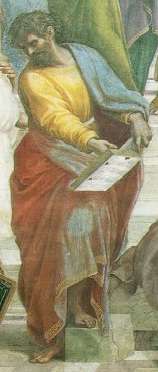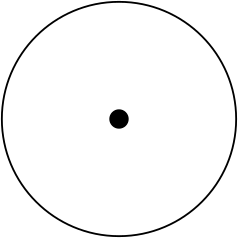Problem of why there is anything at all

The question "Why is there anything at all?", or, "Why is there something rather than nothing?" has been raised or commented on by philosophers including Gottfried Wilhelm Leibniz,[4] Martin Heidegger − who called it the fundamental question of metaphysics[5][6][7] − and Ludwig Wittgenstein.[8]
Overview
The question is general, rather than concerning the existence of anything specific such as the universe/s, the Big Bang, mathematical laws, physical laws, time, consciousness or God. It can be seen as an open metaphysical question.[9][10][11][12]

Criticism of the question's adequacy
Some argue that the question may be inherently illogical; if the universe had no beginning point then its non-existence might never have been an option.[13] One study has suggested a model that eliminates the initial singularity and predicts that the Universe had no beginning but existed forever as a kind of quantum potential before 'collapsing' into the Big Bang's hot dense state.[14][15][16] In other research a possible consequence of "rainbow gravity" might be that the universe had no beginning with time stretching back infinitely without an initial singularity and Big Bang.[17] Similarly physics may conclude that time did not exist before the Big Bang, but 'started' with the Big Bang and hence there might be no 'beginning', 'before' or potentially 'cause' and instead always existed.[18][19] A related view from Augustine of Hippo is that time is part of God's creation.
Philosopher Stephen Law has said the question may not need answering, as it is attempting to answer a question that is outside a spatio-temporal setting, from within a spatio-temporal setting. He compares the question to asking "what is north of the North Pole?"[20]
Some, including philosopher Bede Rundle,[21] have questioned whether nothing can exist.[22][23][24][25][26] Nothing might be a human concept that is only a construct and inappropriate for a description of a possible alternative reality, state, or absence of state.
In a similar vein as Schrödinger's cat, until something is perceived, it both exists and does not exist, i.e. it is unknown. Nothing, having been defined, is itself something, if only at a meta level. If undefined, a.k.a. not being thought about or reasoned, it is not known whether it does not exist or does. Therefore, the default state of anything is neither nothing nor something but unknown.
On causation
Ancient Greek philosopher Aristotle argued that the notion of an uncaused cause was non-sensical, and that the universe was eternal.
David Hume argued that, whilst we expect everything to have a cause because of our experience of the necessity of causes, a cause may not be necessary in the case of the formation of the universe, which is outside our experience.[27]
Bertrand Russell said "I should say that the universe is just there, and that's all",[28] a "brute fact" position also taken by physicist Sean Carroll.[29][30]
Philosopher Brian Leftow has argued that the question cannot have a causal explanation (as any cause must itself have a cause) or a contingent explanation (as the factors giving the contingency must pre-exist), and that if there is an answer it must be something that exists necessarily (i.e. something that just exists, rather than is caused).[31]
Explanations

Gottfried Wilhelm Leibniz wrote: "Why is there something rather than nothing? The sufficient reason [...] is found in a substance which [...] is a necessary being bearing the reason for its existence within itself."[32] Philosopher of physics Dean Rickles has argued that numbers and mathematics (or their underlying laws) may necessarily exist.[33][34] (Particles can emerge from underlying quantum fields under the effects of quantum physics and possibly under other physical laws that may have existed at the start of the Big Bang.)
See also
- Cyclic model
- Ultimate fate of the universe
- Nothing
- Ex nihilo
- Quantum fluctuation
- Baryogenesis
- Big Bang
- Causality
- Existence
- Being
- Conceptions of God
- Criticism of religion § Inhibition to philosophical inquiry and acceptance of the unknown
- Creation myth
- Metaphysics
- Cosmogony
- Infinity
- Infinite regress
- Initial singularity
- Simulation hypothesis
- Pantheism
- Problem of universals
- First Cause
- Question § Philosophy
- Reason
- Something (concept)
- Causal loop
References
- ↑ "Poem of Parmenides : on nature". philoctetes.free.fr. Retrieved 2 May 2017.
- ↑ "The Metaphysics of Nothing". www.friesian.com. Retrieved 2 May 2017.
- ↑ "Parmenides". Ancient History Encyclopedia. Retrieved 2 May 2017.
- ↑ "Principles of Nature and Grace", 1714, Article 7.
- ↑ Martin Heidegger, Introduction to Metaphysics, Yale University Press, New Haven and London (1959), pp. 7–8.
- ↑ "The Fundamental Question". www.hedweb.com. Retrieved 26 April 2017.
- ↑ Geier, Manfred (2017-02-17). Wittgenstein und Heidegger: Die letzten Philosophen (in German). Rowohlt Verlag. p. 166. ISBN 9783644045118.
- ↑ "Not how the world is, is the mystical, but that it is." Tractatus Logico-Philosophicus 6.44 https://www.gutenberg.org/files/5740/5740-pdf.pdf
- ↑ "Metaphysics special: Why is there something rather than nothing?". New Scientist. Retrieved 26 April 2017.
- ↑ Sorensen, Roy (1 January 2015). "Nothingness". The Stanford Encyclopedia of Philosophy. Retrieved 26 April 2017.
- ↑ Dascal, Marcelo (2008-08-09). Leibniz: What Kind of Rationalist?. Springer. p. 452. ISBN 9781402086687.
- ↑ Goldschmidt, Tyron (2014-02-05). The Puzzle of Existence: Why Is There Something Rather Than Nothing?. Routledge. ISBN 9781136249228.
- ↑ Lynds, Peter (10 January 2012). "Why there is something rather than nothing: The finite, infinite and eternal". arXiv:1205.2720 [physics.gen-ph].
- ↑ "What if the universe had no beginning?". earthsky.org. Retrieved 26 April 2017.
- ↑ "Kosmologie: Quantentrick schafft Urknall-Singularität ab" (in German). Retrieved 26 April 2017.
- ↑ "Ein Universum ohne Urknall, Dunkle Materie und Dunkle Energie". Forschung und Wissen (in German). Retrieved 26 April 2017.
- ↑ Moskowitz, Clara. "In a "Rainbow" Universe Time May Have No Beginning". Scientific American. Retrieved 26 April 2017.
- ↑ "No Big Bang? Quantum equation predicts universe has no beginning". Retrieved 26 April 2017.
- ↑ "The Beginning of TIme". Stephen Hawking. Retrieved 26 April 2017.
- ↑ Stephen Law - Closer To Truth
- ↑ Kanterian, Edward (31 October 2011). "Bede Rundle obituary". The Guardian.
- ↑ Bede Rundle - Closer To Truth
- ↑ "Why there's something rather than nothing".
- ↑ "Levels of Nothing by Robert Lawrence Kuhn - Closer to Truth".
- ↑ Bede Rundle - CloserToTruth
- ↑ https://www.hedweb.com/nihilism/nihilfil.htm
- ↑ Gutting, Gary (2016-11-22). Talking God: Philosophers on Belief. W. W. Norton & Company. ISBN 9780393352825.
- ↑ "5 Reasons Why the Universe Can't Be Merely a Brute Fact : Strange Notions".
- ↑ Torres, Phil. ""The evidence is pretty incontrovertible that he doesn't exist": Stephen Colbert's favorite scientist on the universe, naturalism and finding meaning without God".
- ↑ Carroll, Sean M. (6 February 2018). "Why there is something, rather than nothing?". arXiv:1802.02231 [physics.hist-ph].
- ↑ Brian Leftow - Closer To Truth
- ↑ Monadologie (1714). Nicholas Rescher, trans., 1991. The Monadology: An Edition for Students. Uni. of Pittsburg Press, p. 135.
- ↑ Dean Rickles - Closer ToTruth
- ↑ Michael Kuhn (to Christopher Ishaam) – Closer To Truth
Further reading
- Kuhn, Robert Lawrence (2013). Leslie, John, ed. The mystery of existence : why is there anything at all?. Chichester [England]: John Wiley & Sons. ISBN 978-0-470-67355-3.
- Richard Dawkins (2012). afterword. A universe from nothing: why there is something rather than nothing. By Krauss, Lawrence M. (1st Free Press hardcover ed.). New York: Free Press. ISBN 978-1-4516-2445-8.
- Holt, Jim (2012). Why does the world exist?: an existential detective story (1st ed.). New York: Liveright Pub. Corp. ISBN 978-0871404091.
- Sorensen, Roy (1 January 2015). Zalta, Edward N., ed. Nothingness. The Stanford Encyclopedia of Philosophy (Summer 2015 Edition).